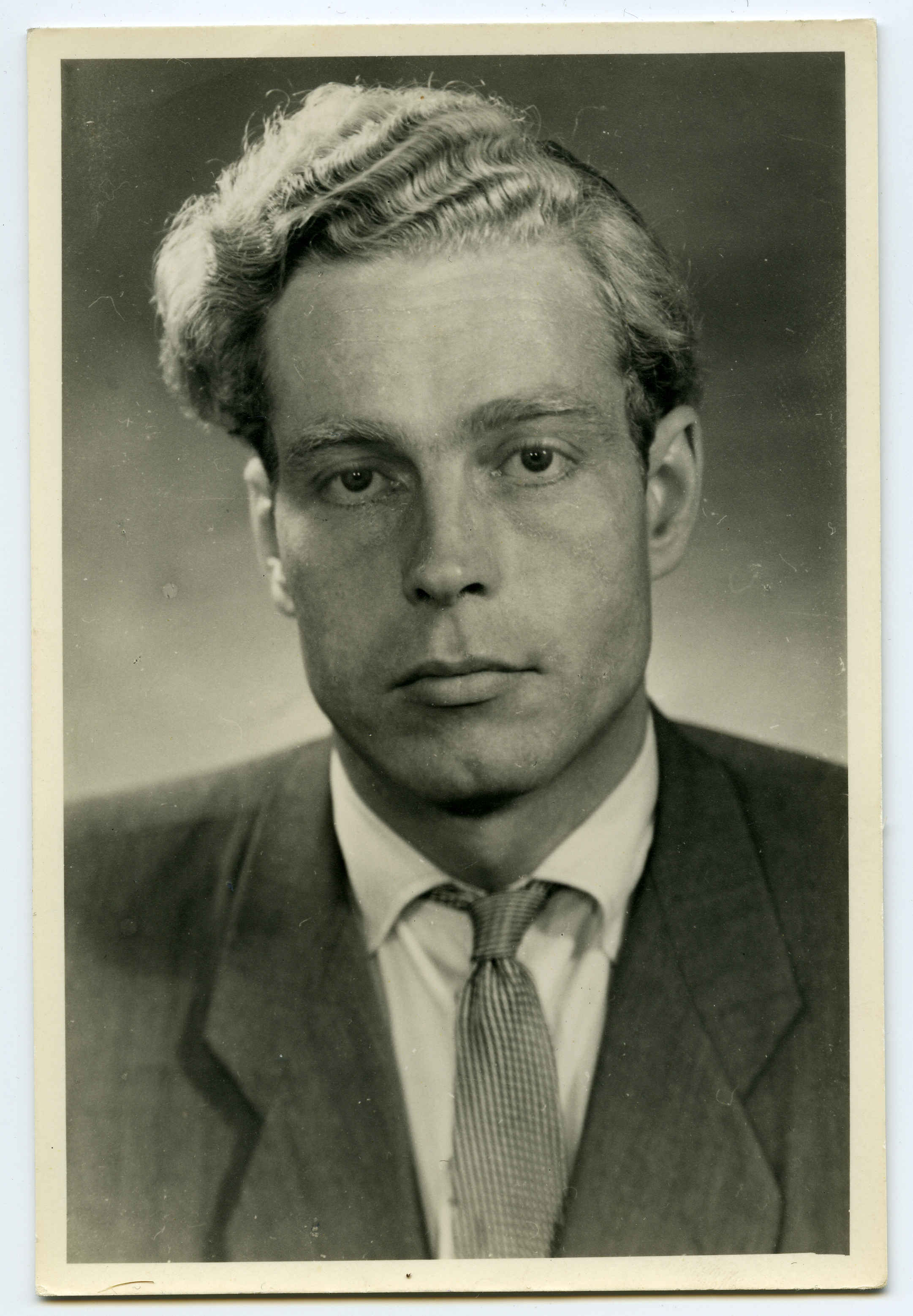
Uno Laht
Uno Laht (until 1936 Brakmann, 30. IV 1924 – 24. IX 2008, pseudonym Onu Thal) was a Soviet Estonian poet, prose writer and publicist.
He was born in Valga and studied in Valga, Loksa and Tallinn. In 1940, he joined Komsomol. He was in a destruction battalion, evacuated to Russia and was drafted by the Red Army. He was wounded and worked and studied in Kazan while recovering. He later participated in Komsomol’s staff trainings in the Leningrad province. After returning to Estonia, he worked for the KGB and was also a participant in arresting Forest Brothers. He was a member of the Communist Party of the Soviet Union (CPSU) from 1953-1990. From 1940-1950, he worked for the editorial boards of Noorte Hääl and Rahva Hääl, later as a poetry consultant of the Writers’ Union. From 1953, he became a freelance writer. He was a member of the Writers’ Union from 1953-1986 and then again from 1992. His poetry collection Mu kallis koduvillane provints (‘My Dear Homely Province’, 1973) received the Juhan Smuul Prize in 1974 and his short story Meie, tippkutid, üle kogu maakera (‘We, Top Dogs, All Around the World’) was given the the Tuglas Short Story Prize in 1975. He died in Tallinn and is buried at Tallinna Metsakalmistu (Forest Cemetery).
His first poem was published in 1946. As a journalist, he published various writings of prose and poetry. His first work Piimahambad (‘Baby Teeth’, 1954), which was the only collection of new poetry in its year of publication, gained attention for its contemporary nature and verse-form topical satire. His sharpest satire was aimed at the faults and shortcomings of Soviet life. The topicality of Laht’s work stands out from the start – he reacts to daily events and offers different character portraits. Piimahambad (plombeeritud) (‘Baby Teeth (With Fillings)’, 1956) was partly a reissue. After the collection Sinelitaskust seanahkse portfellini (‘From Greatcoat Pouch to Pigskin Briefcase’, 1958) was published, he became known as the rough youth poet of his generation. He addressed political topics as well. He became one of the main satire and humor writers of the time and continued in this style in the following decades as well, for example in the collections Kümne küüne laulud (kõhu kõrvalt) (‘Songs of Ten Nails (Not Counting the Stomach)’, 1962), Mu kallis koduvillane provints (‘My Dear Homely Province’, 1973), Roosa müra (‘Pink Noise’, 1981). The selected collections Linnupesa teraskiivris (‘Bird’s Nest in a Steel Helmet’, 1961) and Luuletused 1954-1964 (‘Poems 1954-1964’, 1965) provide an overview of his poetry. His later poetry can be found in the collections Küürakas kaissukippuja (‘The Importunate Hunchback Cuddler’, 1983) and Katastroika ehk Impeerium imendub Musta Auku… (‘Catastroika, or the Empire Absorbed into the Black Hole…’, 1990).
Aside from poetry, he has also written short prose. Here, satire and humor also prevail. Paroodi-koodi-oodiad (‘Parody-Code-Odes’, 1969) collects his parodies and topical satire on the Estonian literature and culture of the time. His short stories are represented in the collection Bordelli likvideerimine (‘Closing the Brothel’, 1974). The collection Lahekudemised (‘Spawnings by Laht’, 1987) provides an overview of his works in journalism.
A. K. (Translated by A. S.)
Books in Estonian
Poems
Piimahambad. Tallinn: Eesti Riiklik Kirjastus, 1954, 76 lk.
Piimahambad (plombeeritud). Tallinn: Eesti Riiklik Kirjastus, 1956, 144 lk.
Sinelitaskust seanahkse portfellini. Tallinn: Eesti Riiklik Kirjastus, 1958, 180 lk.
Selle suve värsid. Luuletusi ja tõlkeid. Tallinn: Ajalehtede-Ajakirjade Kirjastus, 1960, 64 lk.
Suitsuangerjad ja kastemärjad roosid. Tallinn: Eesti Riiklik Kirjastus, 1960, 63 lk.
Linnupesa teraskiivris. Tallinn: Eesti Riiklik Kirjastus, 1961, 110 lk.
Kümne küüne laulud (Kõhu kõrvalt). Tallinn: Eesti Riiklik Kirjastus, 1962, 120 lk.
Luuletused: 1954-1964. Tallinn: Eesti Raamat, 1965, 248 lk.
Ingel läheb apteeki… Korralikus seltskonnas. Luuletusi ja tõlkeid. Tallinn: Eesti Raamat, 1967, 168 lk.
Mu kallis koduvillane provints. Ajalaulud. Tallinn: Eesti Raamat, 1973, 174 lk.
Roosa müra. Satiiri ja lüürikat 1974-1980. Tallinn: Eesti Raamat, 1981, 176 lk.
Küürakas kaissukippuja. Satiiri ja lüürikat: valitud luuletused. Tallinn: Eesti Raamat, 1983, 288 lk.
Katastroika ehk Impeerium imendub Musta Auku. Tallinn: Eesti Raamat, 1990, 254 lk.
Short prose
Onu Thal, Paroodi-koodi-oodiad. Kirjanduslikke paroodiaid ja muid pilalugusid. Tallinn: EKP KK Kirjastus, 1969, 112 lk.
Bordelli likvideerimine. Tallinn: Perioodika (Loomingu Raamatukogu), 1974, 72 lk.
Peost-suhu-jutte. Jutustused. Tallinn: Eesti Raamat, 1982, 248 lk.
Lahekudemised. Olukirjeldused, portreed, kriitilised artiklid. Tallinn: Eesti Raamat, 1987, 340 lk.
Jeestlased, nende jänkipoodid ning muud Balti pudrulõuad. Lühiproosat. Tallinn: Maa, 1995, 224 lk.
Onu Thal, Ei ühtegi ohmut tagasi Toompeale!!!. Eesti erakondade paiknevuse ja tähtsamate tippkuttide välimääraja. Tallinn: Tallinna Mööblimaja, 1995, 30 lk.



